Rather than the often repeated adage that the victors write the history of an event, the story of anything is actually determined by the unswerving adoption of one version of it, and the telling of that version by a determined cadre of writers. In time, the version with the most persistent adherents becomes the "truth".
- David & Jeanne Heidler in Henry Clay: The Essential American (2010)
Part 1 of this series showed how the same event can be misremembered in different (and erroneous ways). In
Part 2 I took my personal experience with seeing
Inherit The Wind as a child and how it influenced my view of the events upon which it was supposedly based.
In Part III, we'll do some exploration of the actual event upon which Inherit The Wind
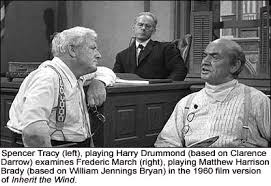
was based in order to rescue the historical figures from the caricatures they became in the play and to see the pitfalls in trying to neatly cast past events into today's political context. History is actually much more complex and interesting when we don't try to shoehorn it into our preconceived categories. As mentioned in the last post, many of the best insight on this history can be found in Edward Larson's 1997 book,
Summer For The Gods.
Inherit The Wind was based on the Scopes "Monkey" Trial which took place in Dayton, Tennessee in July of 1925. The play and books by influential historians such as
Richard Hofstadter (who has done great damage to generations of college students) portray the story as angry, narrow-minded Fundamentalist bigots against the forces of liberal reason and tolerance. I happen to think teaching evolutionary theory is a good idea but that portrayal is a gross distortion of reality and does a particular disservice to the motivations of Williams Jennings Bryan.
The Background
During the 1920s there were efforts in many states to pass laws forbidding the teaching of evolutionary theory in public schools. Two things triggered this. First, arguments between some religious denominations and Darwinists had been heating up over the past two decades. There is still controversy over who started it, but there were advocates in both the scientific/academic and religious communities who were looking for a fight. Second, public high schools (the battleground for the teaching of evolution) were rapidly expanding. In 1890 there were fewer than 200,000 students nationwide in public high schools. By 1920 there were nearly two million. Tennessee, which had fewer than 10,000 high school students in 1910, had more than 50,000 in 1920. What these students were to be taught was becoming a more pressing issue.
Legislative efforts were successful in a small number of states including Tennessee which passed its law in early 1925. It was part of a larger package of laws which constituted a massive education reform bill that laid the foundation for state supported public schools and which were signed into law by the progressive Gov. Peay. Violation of the ban on teaching evolution carried a $100 fine but no jail time. William Jennings Bryan had lobbied against having any fine attached to violating the provision on the teaching of evolution. No one at the time expected it to be a statute under which prosecutions would occur.
However, the American Civil Liberties Union, looking for a test case, placed an ad in Tennessee papers offering to defend anyone prosecuted under the Act. The people of Dayton decided to take them up on it. While some were actively interested in challenging the law, many others saw it as a good opportunity to create publicity and generate business for the town. Rather than the contentious, divided populace portrayed in the play, the time of the actual trial presented a festive atmosphere according to reporters like HL Mencken. The key players in Dayton recruited a young, part time schoolteacher named John Scopes to be the defendant and agreed to pay any penalty imposed on him.
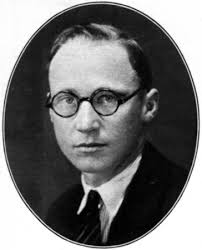 (John Scopes)
(John Scopes)
Dayton was a small town in East Tennessee and part of the only Republican enclave in the Deep South. Bryan won every southern state in each of his three presidential runs but never carried Rhea County in which Dayton was located.
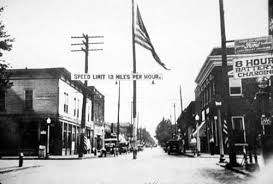 (Dayton in 1925)
(Dayton in 1925) The town was also heavily Methodist in a state dominated by Baptists. (As a side note, the Baptist Convention meeting in Memphis just before the trial refused to add an antievolution plank to the denomination's statement of faith).
Once the ACLU came into the case, William Jennings Bryan, the country's leading opponent of the teaching of evolution agreed to become part of the prosecution's team. And through some very complicated machinations, Clarence Darrow, the most famous criminal defense lawyer in the U.S., joined the defense team. When this happened the trial became the biggest story in the country and was also followed heavily in Europe.
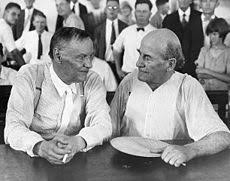 (Darrow and Bryan)
(Darrow and Bryan) A deluge of reporters descended on Dayton.
Why Evolution? Why Bryan?
In 1925, 65 year old William Jennings Bryan was one of the best known people in America. He had run unsuccessfully three times as the Democratic party's presidential candidate (1896, 1904, 1908).

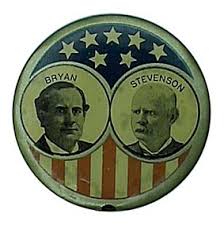
A remarkable orator (his "Cross of Gold" speech at the 1896 convention secured him the nomination) he is considered the first Populist to run for President. Under Woodrow Wilson, he became Secretary of State, resigning in 1915 when, as a pacifist, he became convinced Wilson was maneuvering the country into entering the First World War.
As a Populist, Bryan campaigned successfully in support of four constitutional amendments; Direct election of senators, the Federal income tax, Women's Suffrage and Prohibition. Doesn't sound like a guy who fits the
Inherit The Wind template. So, why in the 1920s did he undertake leadership of the crusade against the teaching of Darwinism and why did he think it was consistent with his other views?
The first, and probably subsidiary reason, was Bryan's belief in "popular sovereignty". Bryan had always campaigned against big business and the banks and on behalf of the common people. When the Supreme Court overturned some of the early progressive labor laws, Bryan supported (unsuccessful) legislation to limit judicial review. He supported the Progressive move towards the use of popular referendums. It was his strong belief that the people were entitled to what they wanted and he saw the evolution issue in the same way. According to Bryan:
"It is no infringement on their freedom of conscience or freedom of
speech to say that, while as individuals they are at liberty to think as
they please and say what they like, they have no right to demand pay
for teaching that which parents and the taxpayer do not want taught"
The deeper reason was Bryan's concerns about the implications of Darwinism. Bryan was a committed Christian, pacifist and believer in the dignity of every human being. As a matter of religious faith he rejected evolutionary theory but beyond that he believed Darwinism and its doctrine of "survival of the fittest" threatened the dignity and perhaps even the very existence of the weakest of the human flock. Bryan saw a direct connection between the excesses of capitalism and militarism which he had denounced throughout his career and Darwinism and, as early as 1904, had called it "the merciless law by which the strong crowd out and kill off the weak".
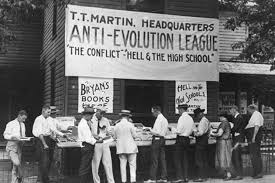
One event and one trend since those 1904 remarks had reinforced Bryan's concern. The event was the First World War. Watching this slaughter appalled Bryan (and many others). He saw German militarism as Darwinian selection in action and read the words of Vernon Kellogg in his book
Headquarters Nights recounting his discussions with German and concluding that "Natural selection based on violent and fatal competitive struggle is the gospel of the German intellectuals". Bryan saw the modernist wing of the Progressives, led by Woodrow Wilson willing to go down this same road.
It is striking to see how much Darwinism was "in the air" of politics at the time. Below are excerpts from Woodrow Wilson's key 1912
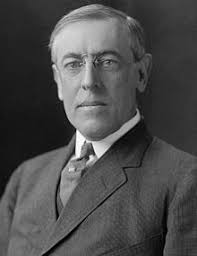
campaign speech "
What is Progress?" which espouses a Darwinian approach to American government:
"Now, it came to me, as this interesting man talked, that the
Constitution of the United States had been made under the dominion of
the Newtonian Theory. You have only to read the papers of the The Federalist
to see that fact written on every page. They speak of the "checks and
balances" of the Constitution, and use to express their idea the simile
of the organization of the universe, and particularly of the solar
system,—how by the attraction of gravitation the various parts are held
in their orbits; and then they proceed to represent Congress, the
Judiciary, and the President as a sort of imitation of the solar system. . . .
Living political constitutions must be Darwinian in
structure and in practice. Society is a living organism and must obey
the laws of life, not of mechanics; it must develop.
All that progressives ask or desire is permission—in an era when
"development" "evolution," is the scientific word—to interpret the
Constitution according to the Darwinian principle; all they ask is
recognition of the fact that a nation is a living thing and not a
machine."
The trend provided an even stronger affirmation of Bryan's fears about Darwinism. It was the growth of the new science of eugenics. What was eugenics? Well, the high school textbook used by John Scopes was
A Civic Biology by George William Hunter. In his textbook, Hunter defined eugenics as
"the science of improving the human race by better heredity". According to
A Civic Biology:
"If such people were lower animals, we would probably kill them off to
prevent them from spreading . . . Humanity will not allow this, but we do
have the remedy of separating the sexes in asylums or other places and
in various ways preventing intermarriage and the possibility of
perpetuating such a low and degenerate race"
The prior edition of Hunter's textbook contained language specifically citing biological deficiencies of African races.
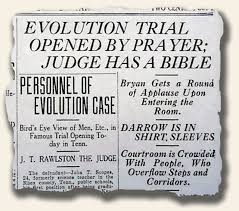
Eugenics had many scientist adherents in the United States and in England who believed that the human race could be made better via selective breeding so we could have progressively better people to create a more progressive and scientific world. One of those leading scientists, AE Wiggam, expressed the connection between the teaching of evolution and eugenics:
"until we can convince the common man of the fact of evolution
. . . I fear we cannot convince him of the profound ethical and
religious significance of the thing we call eugenics"
By 1935, more than 30 states had laws mandating sexual segregation and sterilization of persons regarded as eugenically unfit. The most notorious expression of support for eugenics was in 1927 by the leading Social Darwinist on the Supreme Court, Oliver Wendell Holmes Jr,
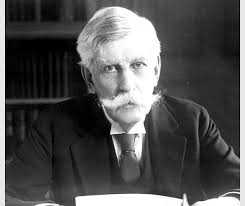
who in his opinion for the Court upholding Oklahoma's sterilization law wrote "three generations of imbeciles is enough". The only dissenting vote was cast by Pierce Butler,
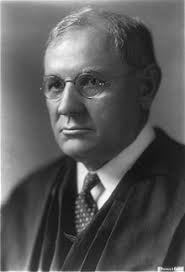
the lone Catholic on the Court. However, within a few years WWII and the revulsion against Nazi law and experimentation would put an end to the eugenics movement (though a revival of eugenics under another name is conceivable with modern advances in biology and genetics).
Thus the 1920s saw the heyday of both the eugenics movement and the rise of antievolutionary forces which is what led to Dayton in 1925. Bryan expressed his pithy view when commenting on the latest discovery of purported early human remains:
"Men who would not cross the street to save a soul have traveled across the world in search of skeletons".
Even earlier than eugenics, the antievolutionary legislative struggle would peak as every additional state in which they were proposed rejected the bills in the late 1920s.
Final Notes On The Trial And Its Aftermath
The ACLU and Darrow differed on trial strategy. The ACLU wanted to approach it as a free speech case but that was not Darrow's interest. As a militant atheist who did not believe in free will, he wanted to use the trial as an opportunity to directly assault Christianity and its beliefs about the creation of the universe and of the human race. There was a great deal of discomfort about this by ACLU supporters but through a complicated series

of events, Darrow seized control of the trial strategy and was cleverly lable to lure Bryan to the stand where he cross-examined him viciously on Biblical inconsistencies (by the way, you'd want Clarence Darrow defending you if you were on trial) .
This prompted a note to the ACLU from a Congregational Church official who supported the challenge:
"May I express the earnest opinion that not five percent of the ministers in this liberal denomination have any sympathy with Mr Darrow's conduct of the case"
and from Edwin Mims of Vanderbilt University, another supporter of the ACLU:
"When Clarence Darrow is put forth as the champion of the forces of enlightenment to fight the battle for scientific knowledge, one feels almost persuaded to become a Fundamentalist."
The jury quickly returned a verdict finding Scopes guilty. Bryan offered to pay the $100 fine. The local school board offered to renew his contract for another year but Scopes decided to go to graduate school, attending the University of Chicago and becoming a petroleum engineer.
Five days after the end of the trial, William Jennings Bryan passed away while taking his afternoon nap.
 (Bryan funeral services)
(Bryan funeral services)
.JPG)
.JPG)
.JPG)
.JPG)
.JPG)
.JPG)
.JPG)
.JPG)